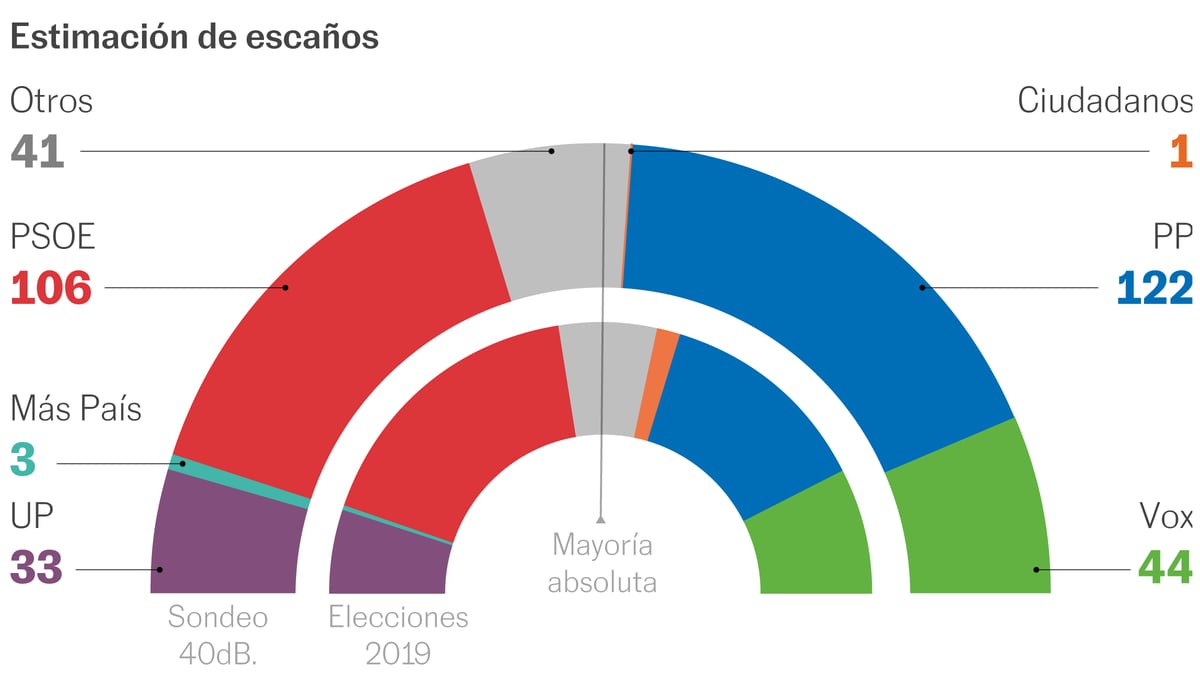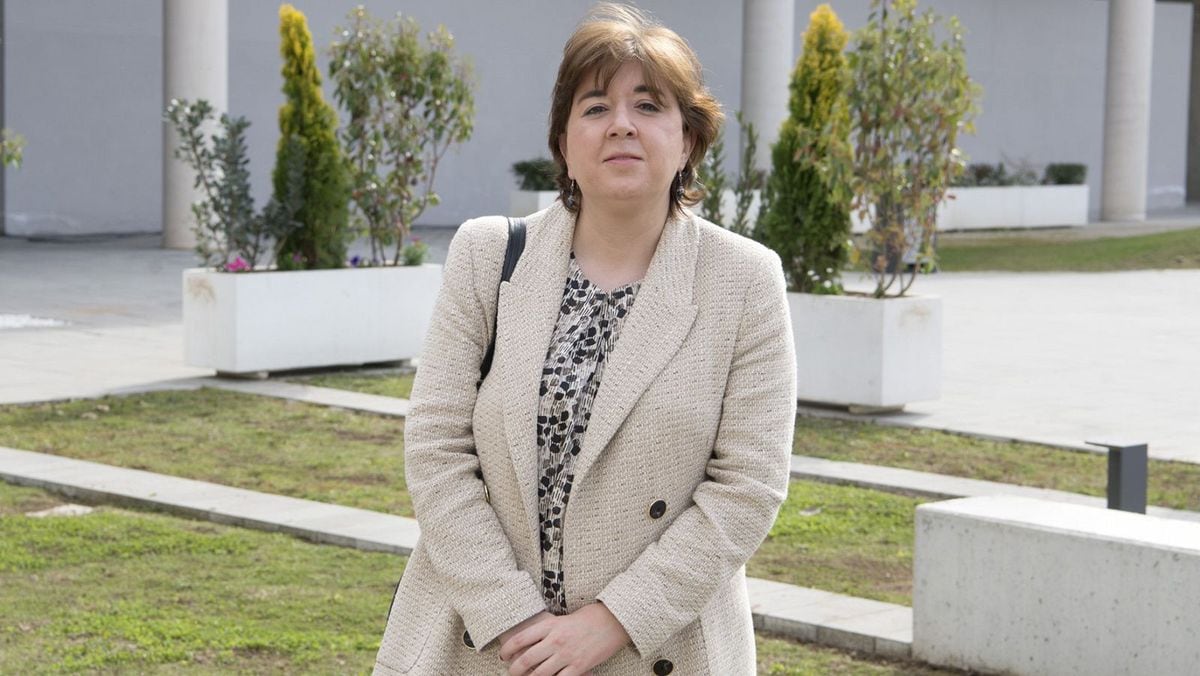The ultimate 40dB barometer.
for EL PAÍS and la SER it shows a certain stability between the two big parties, the PSOE and the PP, and a little more movement below them.
For the third consecutive month, the difference between the two stands at around two points in favor of the formation chaired by Alberto Núñez Feijóo, who loses one tenth in vote estimation compared to the previous barometer, while the Socialists drop half a point.
By seats, the popular ones add one compared to the previous barometer, until reaching 122, which is 33 more than those they obtained in the last elections.
The PSOE would maintain the 106 that the February poll indicated, that is, 14 less than its current balance in the lower house.
The survey, with a sample of 2,000 online interviews, was carried out between February 23 and 26.
The internal data of the poll can be consulted in its entirety on the EL PAÍS website.
There are less than 10 months left for the general elections, scheduled for December.
The PP consolidates its hegemony in the block of the right.
The popular take 40.9% of the loot from former Ciudadanos voters and 12.9% of Vox voters.
Cs worsens an already very precarious situation, loses a tenth compared to the previous barometer, making it even more difficult for him to obtain parliamentary representation in the next general elections.
For its part, Santiago Abascal's party worsens its electoral prospects by almost one point since the last barometer, when the poll gave them two more deputies than now, and they would lose eight seats compared to their 2019 results, when they became the third force in Congress, with 52. At the time the interviews were carried out, Vox's intention to present a motion of censure against Pedro Sánchez with the former leader of the PCE Ramón Tamames as a candidate was already known.
The numbers do not come out and the President of the Government will continue in his post.
The PP, which he accuses of "
show
” initiative, will abstain from voting.
In the previous motion of no confidence, in October 2020, when Abascal presented himself as an alternative candidate, Pablo Casado still being the leader of the PP, the popular voted against.
More information
A third of Spaniards arrive "just" at the end of the month
During the days in which the survey was carried out, several cases of corruption linked to the two main parties also made headlines.
The so-called
Mediator case
broke out , a criminal plot in the Canary Islands for which a former PSOE deputy, Juan Bernardo Fuentes Curbelo, known as
Tito Berni,
and an intermediary, Marcos Antonio Navarro Tacoronte, allegedly charged thousands of euros from a group of businessmen with the promise that they would free them from sanctions or provide them with licences, contracts and subsidies.
On the dates in which the 40dB barometer was carried out.
The Senate agreed to investigate the mayoress of Marbella, Ángeles Muñoz, of the PP, and a candidate for re-election in May, that she did not declare all her assets at the beginning of the legislature.
The councilor had updated her statement after the judicial prosecution of her husband, Lars Broberg, who died on Saturday, and her stepson, arrested in 2021 for allegedly being part of a drug trafficking and money laundering plot in the Sunshine Coast.
Feijóo's party continues to fish in the socialist fishing ground (6.2% of PSOE voters would now opt for the PP), although Pedro Sánchez's party seems to stop that leak, which drops one point compared to the previous barometer.
That transfer of votes is marginal in reverse.
The voter loyalty of the popular stands at 80.7%, very similar to that of February, and that of the PSOE, at 68.8%, better than then, although it manages, in turn, to capture fewer votes than United We Can that last month (7.3%).
While the PSOE loses half a point with respect to the previous barometer, the space to its left recovers ground.
Unidas Podemos would reach 12.3% of the vote, which translates into two more seats than last month, up to 33. The struggle in the Government regarding the unwanted effects of the law
of only yes is yes
, that has caused releases and reductions in sentences for sexual offenders, does not take its toll on the second party of the coalition and head of the Equality portfolio, which will vote against taking into consideration the socialist proposal for its reform.
Más País, the formation led by Íñigo Errejón, rose three tenths, up to 3.3% of the vote estimate, and remained at three seats with the possibility of obtaining a fourth seat in Congress.
The socialists do not dominate their own electoral space as clearly as the PP: Unidas Podemos would be the party with the most votes among voters who are located in positions 0, 1 and 2 of the left-right ideological axis, while the popular ones cover all the positions of the center right and right, from 6, and only in the extreme, 10, the party of Santiago Abascal would be the favorite.
By blocks, the right (PP and Vox) would add 166 deputies today, one less than in the previous barometer, and the left would obtain 142, two more than in February.
The sum inverts the current composition of Congress, in which the two parties of the coalition government occupy 155 seats, 14 more than the right.
The average position of Spaniards stands at 4.7 on the left-right ideological axis;
and in 5.3 in the territorial axis, with 0 being the position the most favorable to decentralization and 10 the most in favor of the centralization of the State.
The popular ones occupy the entire spectrum of pro-centralization voters, displacing Vox, the most critical of the State of the autonomies.
Meanwhile, Unidas Podemos is the favorite option among the less centralist voters (positions 0 and 1 of the axis) and the PSOE among those moderately pro-decentralization and equidistant (positions 2, 3, 4, and 5).
As for the mobilization, it drops slightly compared to the previous month: 54.5% of Spaniards with the right to vote assure that they will go to the polls "with absolute certainty" in the next general elections.
By parties, the most mobilized are the voters of Más País (73.5%), followed by the supporters of Unidas Podemos (72.3%), Vox (70.8%) and PP (68.3%).
Former PSOE voters seem to be the most disenchanted: only 60.6% say they will vote safely, which is one of the lowest percentages recorded in the entire legislature.
Data sheet:
Scope: Spain.
Universe: general population residing in Spain (except Ceuta and Melilla) over 18 years of age and with the right to vote.
Sample size: 2,000 interviews.
Quotas by sex, age, autonomous community, habitat size and social class.
Procedure: online interview (CAWI).
Sampling error: ±2.2% (for 95% confidence).
Date of completion: from February 23 to 26, 2023.



/cloudfront-eu-central-1.images.arcpublishing.com/prisa/RUNTVUOYUJENUN2EWKUKWGRZPI.jpg)


/cloudfront-eu-central-1.images.arcpublishing.com/prisa/M3MCZT5V6VFJDDOWEKFFP77LRM.jpg)

/cloudfront-eu-central-1.images.arcpublishing.com/prisa/EMVMZ7U3KNFW5FQ5KGATJVCFCI.jpg)
